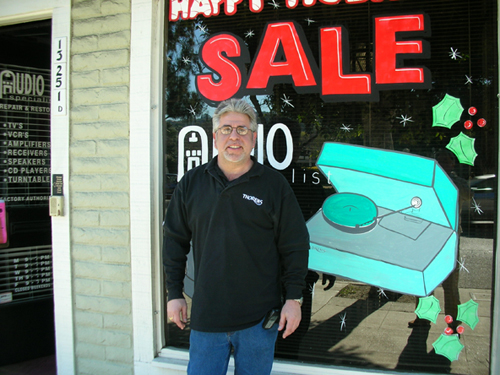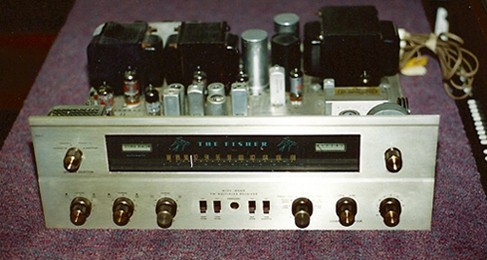Hi-Fi in the 21st Century - An Interview with Howard Bardach
By Ken Hamberg
In the age of the digital music download and the pervasive presence of tiny portable MP3 players and earphones as the listening method of choice, Howard Bardach enjoys a unique position as both a proponent and purveyor of the true audiophile tradition among music enthusiasts. The man loves his work, and his enthusiasm for the sound quality and musicality of classic analog gear and recordings borders on the evangelical.
Working from his Ventura Boulevard shop The Audio Specialist in Studio City, California since 1995, Mr. Bardach is a trained, certified electronics technician who's been repairing, refurbishing, and selling vintage hi-fi amplification, playback, and recording equipment since 1978. He's seen the heyday of analog recording and he's been there for the dawn of the digital domain, and he has plenty to say about both mediums as a lecturer, radio commentator, and member of the AES and other audio organizations.

There appears to be a yearning among many younger musicians and music fans for a richer, more tactile, and more personalized listening experience than that offered by monitoring an encoded computer file. Considering the recent resurgence of interest in vinyl recordings and all things tube, Mr. Bardachs's comments and insight make this interview particularly interesting and timely.
You made an important point in an earlier interview stating that recording equipment from the 1950's and 60's was superior to the playback equipment available at that time. Could you elaborate on that? Is the playback equipment available today much better?
Yes of course. In the 1950's most if not all of the recording engineers were first and foremost MUSIC LOVERS. They had to have a technical background because most of the equipment in the recording studio was hand-built by the engineers. The equipment and the studios were quite primitive compared to the studios of today, but there was a tremendous desire to put out the best possible recorded sound. Making a profit was a secondary consideration. Later on with the improved quality of the playback equipment, the flaws came out as well as the positive results of the recording. Generally speaking the playback equipment is much better today in terms of sound quality, though not necessarily in quality of construction. We're also seeing vacuum tube recording equipment reintroduced to the market.
A number of both indie and major label artists and record labels have begun releasing new recordings on "180-gram vinyl”. What is meant by that term? Is a special turntable required to play the record properly?
It simply means that the record itself weighs 180 grams. It is thicker and therefore a higher grade of vinyl material. No special turntable is needed. The least expensive to the most expensive turntable on the market can be used. Many years ago RCA Records came out with their version of a record called Dynaflex. It was very thin and very pliable, so pliable that they thought record warping would be almost eliminated. The opposite happened, plus the records would slip on the platter when they were used with a record changer, since the records would be stacked on top of each other.

You service a lot of vintage hi-fi tube amplifiers. Is it hard to acquire high-quality tubes these days?
No. The quality does vary from time to time, so I do watch very carefully for flaws within the tubes. As of this writing, the best tubes are coming from Russia, with the Slovak Republic second and the Chinese a distant third. I do not deal with "new old stock” tubes because I cannot guarantee them if one fails. In the tube heyday, the Germans made the finest audio tubes. The United States does not produce any tubes at all at this time. The last American tube manufacturer stopped production sometime in the 1980's. These days thankfully it is not hard to obtain high quality tubes: that I can guarantee.
You also service older tube guitar amplifiers. Do you do any "hot rod” modification or is the work largely repair and restoration?
While I do also repair older guitar tube amps, I do not as a rule do any "hot rod” modifications. What I have always done and still do is circuit improvement that I feel will increase the reliability of the unit rather than change its sound quality. I have seen so many modifications done to amplifiers that on occasion I won't repair an amp since it is so different from the original schematic design, and the person with the modified unit rarely has a schematic of it.
Are MP3 players the death of hi-fi, or are you seeing a backlash as expressed in the renewed interest in and manufacture of vinyl?
I find that MP3 players have attracted a whole new generation of listeners but unfortunately their point of reference is an MP3 player, which is not a true source of good sound. How many people these days are listening to unamplified sound for long periods of time through earphones? MP3 users are exposed to much more music, and one would hope that their exposure will open their ears and minds to different kinds of music, if not necessarily good sound reproduction. If you look at what's happening lately with vinyl records though, it is far from being put to rest.
Would you please give us your opinions on the qualitative differences you perceive between analog and digital recordings?
The differences between analog and digital recordings? Let me quote what my customers tell me, simply and to the point, and keep in mind that most of them do not have a trained ear. They say that the analog recordings have a richer, warmer, and more focused sound and that while digital recordings sound cleaner, they're more sterile and lack the full harmonic content of the instruments. Generally speaking though, I will say that digital recordings have come a long way since the early days of CD's.
Would you care to weigh in on the tube versus solid state debate?
There are advantages and disadvantages to both solid state and vacuum tube equipment. The advantage of tubes is that they have a warmer sound. When they are driven into clipping they tend to clip softer than a solid state amp. There's usually a so-called "warning time” before a tube amp fails, and it usually fails with some smoke and a burning smell. The disadvantages are that they are heavier than a solid state amp with the same output rating. They consume more electricity, and they can get very hot.
The advantages of solid state amps are that they generally consume less electricity, they're lighter, and they run cooler. The disadvantages are that they tend to have a harder sound. They clip harder which tends to make them sound not as warm and smooth as a tube amp. They can blow out without any warning, and at times will take out the speakers as well. I should add that what I say here is just a fraction of the ongoing debate concerning solid state and vacuum tube equipment; that subject is a topic unto itself.
I will say that owning tube versus solid state equipment is generally more expensive, due to the maintenance of the tubes. I've rarely had a customer go from a tube unit back to a solid state unit, but I do have many customers go from solid state to tube equipment with no regrets.

Does your customer base for the repair and purchase of vintage audio equipment seem to be getting younger?
Yes. Many of the baby boomers that could not afford the equipment 30 years ago now want that same equipment because they remember how good it sounded or how good it looked, or both. This is true for both sexes. I have many younger customers for example, who are looking to buy record players so that they can listen to their Dean Martin records.
Is there a new generation emerging here, reviving the old-school tradition of sitting down and listening to music as pure recreation?
Yes. Especially now with the bad economic news, people are finding ways to escape from the troubles of today and they do it with music. This has been done for generations, using music as an escape.
You've lamented publicly upon the disposable culture we live in, particularly as it relates to the manufacture of consumer electronics. Is the vintage stuff truly superior in terms of sound and durability?
We are living in a disposable society whether it is electronics, cars or computers. Anything that we own today that has been purchased within at least the last 10 years or so is made to be thrown out and not built to last. We talk about our landfills piled up with junk that does not decompose, and the manufacturers are to blame. Every six months or so they come out with a new product that is not compatible with the unit that you just bought, which by the time you figure out how to use it and all its features is obsolete. The vintage equipment is built better for sure. It has a real power supply, and it has a real metal or steel chassis instead of one plastic board. The equipment was built with more pride and quality. It was built to be repaired and not thrown out. Nothing that you purchase today will last 30 years or so like a vintage receiver or turntable. You are lucky if you get 3 years of service from it.
Are there any companies currently manufacturing audio products that are built to last and competitive in sound quality with the classic gear?
Yes there are, but what you have to be aware of is how long they have been in business and what kind of support they provide. There have been many companies that have produced excellent-sounding equipment with quality manufacturing, but they've disappeared and the owner is left with a big boat anchor. I cannot tell you how many units I have repaired from companies that are history. Here today gone yesterday.
You've been in business for a long time. Is the market big enough to sustain craftsmen like you in the future?
I have been in business for more than 31 years. The market is big enough for more people like me in the future, but I will tell you that I do not think that this will happen. This is simply because this generation is told not to keep or repair what they have. At the core, the public schools do not offer industrial education classes any longer. We are not taught how to use our hands. We are instructed to throw away equipment and buy new when something stops working. This is one of the main reasons why this country is in such a deep, dark economic hole. I do not mean to sound depressing, but I feel that I speak the truth and I'm very realistic about it - no pun intended. Thank you for the opportunity to share some of my thoughts.
Well, thanks so much for sharing your thoughts with us, Howard. It's been very enlightening.